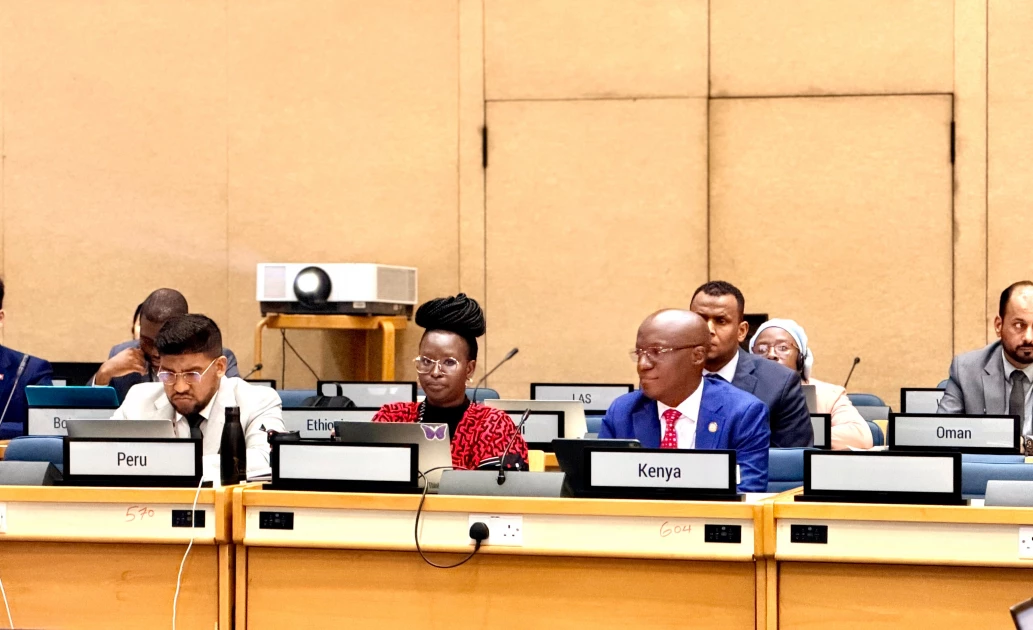Kenya champions sustainable AI in draft resolution for UN Environment Assembly

Kenya's Tech Envoy Ambassador Philip Thigo was among UNEP delegates when he submitted draft resolutions for Environmental Sustainability ahead of UNEA-7. Photo/Handout

Audio By Vocalize
Kenya’s Special Envoy on Technology, Ambassador Philip Thigo on Friday championed for sustainable AI under a draft resolution titled “𝗦𝗮𝗳𝗲, 𝗥𝗲𝘀𝗽𝗼𝗻𝘀𝗶𝗯𝗹𝗲 𝗮𝗻𝗱 𝗦𝘂𝘀𝘁𝗮𝗶𝗻𝗮𝗯𝗹𝗲 𝗔𝗿𝘁𝗶𝗳𝗶𝗰𝗶𝗮𝗹 𝗜𝗻𝘁𝗲𝗹𝗹𝗶𝗴𝗲𝗻𝗰𝗲 𝗳𝗼𝗿 𝗣𝗲𝗼𝗽𝗹𝗲 𝗮𝗻𝗱 𝗣𝗹𝗮𝗻𝗲𝘁.”
In the draft resolution, Kenya seeks environmental consciousness of the global AI governance architecture by placing environmental sustainability as a core pillar of the global AI order.
“𝖳𝗁𝗂𝗌 𝗋𝖾𝗌𝗈𝗅𝗎𝗍𝗂𝗈𝗇 𝗌𝖾𝖾𝗄𝗌 𝗍𝗈 𝖾𝗇𝗌𝗎𝗋𝖾 𝗍𝗁𝖺𝗍 𝖺𝗌 𝖠𝖨 𝖺𝖽𝗏𝖺𝗇𝖼𝖾𝗌, 𝗂𝗍 𝖽𝗈𝖾𝗌 𝗌𝗈 𝗋𝖾𝗌𝗉𝗈𝗇𝗌𝗂𝖻𝗅𝗒 — 𝗋𝖾𝖽𝗎𝖼𝗂𝗇𝗀 𝗂𝗍𝗌 𝖾𝗇𝗏𝗂𝗋𝗈𝗇𝗆𝖾𝗇𝗍𝖺𝗅 𝖿𝗈𝗈𝗍𝗉𝗋𝗂𝗇𝗍 𝗐𝗁𝗂𝗅𝖾 𝖺𝖼𝖼𝖾𝗅𝖾𝗋𝖺𝗍𝗂𝗇𝗀 𝖼𝗅𝗂𝗆𝖺𝗍𝖾 𝖺𝖼𝗍𝗂𝗈𝗇, 𝖻𝗂𝗈𝖽𝗂𝗏𝖾𝗋𝗌𝗂𝗍𝗒 𝗉𝗋𝗈𝗍𝖾𝖼𝗍𝗂𝗈𝗇, 𝖺𝗇𝖽 𝗉𝗈𝗅𝗅𝗎𝗍𝗂𝗈𝗇 𝗋𝖾𝖽𝗎𝖼𝗍𝗂𝗈𝗇,” said Ambassador Thigo.
In UNEA-7 resolutions, the host country of the 7th Environment Assembly provides a rationale for harnessing AI to accelerate the progress of environmental sustainability goals.
On the other hand, Kenya vouches for green AI – which can be achieved through energy-efficient algorithms, renewable-powered compute, and circular-economy hardware design.
A dual imperative proposed by Kenya aims to protect and restore the environment while minimizing the environmental costs of AI systems.
The environment viability approach is adopted in the AI lifecycle, where sustainability is the core pillar in covering extraction, manufacturing, energy use, and end-of-life disposal.
Through multilateralism, Kenya’s draft resolution also calls for capacity building to ensure access to AI is responsible and sustainable for all countries.
“The resolution also recognizes that developing countries require capacity, data infrastructure, and financial support to participate equitably in the AI era. It therefore calls for coordinated action across the AI Stack — data, compute, talent, and use-cases — anchored in environmental integrity,” Kenya’s Tech Envoy presented.
Countries such as Kenya have borne the brunt of climate change, where calamities such as floods and drought have affected their populations.
The UNEA-7 resolution, therefore, advocates for the integration of AI in climate adaptation and disaster-risk reduction efforts.
Kenya proposes that the United Nations Environment Programme (UNEP) prepare a Global Stocktake Report before UNEA-8 in 2026, and compile national data and stakeholder inputs on AI’s environmental impacts. This, Kenya argues, will provide an evidence base for future normative and policy work.
The host country of UNEP also addresses the inclusion of environmental sustainability into AI safety and ethical frameworks. This is through the development of voluntary guidelines on sustainable AI governance.
UNEA-7 will bring countries together to address the decline of the natural world and to forge a more sustainable future.
This year’s summit will be held in Nairobi from December 8 to December 12 and will feature conversations, including addressing the environmental impact of artificial intelligence.
Some of the concerns on the environmental sustainability of AI include the fast-growing data centres that produce electronic waste, often consisting of hazardous substances, like mercury and lead. The data centres are also large consumers of water, which is becoming scarce in many places.
Data centres also rely on critical minerals and rare elements, which are often mined unsustainably.
Advances in AI also lead to massive consumption of electricity. The United Nations has largely proposed the use of renewable energy in the AI lifecycle to reduce the carbon emissions from the technology sector, which has reported a steady increase.
The International Energy Agency (IEA) in 2024 found that data centres, which provide computing power and data storage for AI, consumed 1.5% of electricity.
“Governments must aim to meet all new electricity demand with renewables. AI can boost efficiency, innovation, and resilience in energy systems. But it is also energy-hungry. A typical AI data centres eat up as much electricity as 100,000 homes,” remarked UN Secretary-General António Guterres during the release of the UN Energy Transition report 2025.


Leave a Comment